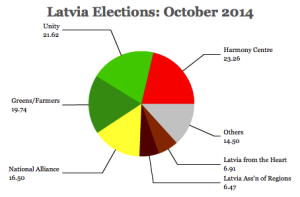Latvia, the centre-right governing coalition has won the elections.
6 Oct 2014A party mainly backed by ethnic Russians won the largest number of votes in Latvia’s parliamentary elections this weekend, but is likely to be shut out of government after fears over a resurgent Kremlin dominated the campaign.
The Harmony party, led by the mayor of Riga, Nil Ushakov, won 23% of the votes in the elections, while the coalition of three current ruling parties had 56% between them.
At the last elections in 2011, the Harmony Centre Party won with 28 per cent of the vote, although it was kept out of a coalition government of ethnic Latvian parties. 
The annexation of Crimea in March has left the party in a delicate position. Many of its core supporters get their news from Russia, and as a result there is a strong pro-Moscow leaning. SKDS found that 36 per cent of the community supported Russia’s actions in Crimea. “Therefore they cannot criticise Russia even if it is obvious that Russia is supporting military actions [in Ukraine],” says Elizabete Krivcova of activist group Non-Citizens Congress, who also stood as a candidate for the Harmony Centre Party in May’s European Parliament elections.
The leftist Harmony party, allied with Russian President Vladimir Putin’s United Russia party, won only 24 of 100 seats, down from 31 in the outgoing assembly, full official results showed Sunday.
The three parties in Prime Minister Laimdota Straujuma‘s centre-right governing coalition secured a sound 61-seat majority, which could rise to 69 with a fourth party possibly joining in.
In the outgoing parliament formed after the last polls in 2011, a four-party coalition held 63 seats.
Under the constitution the new parliament will open on November 4.
Concern is running high over the impact that tit-for-tat sanctions between Moscow and Brussels over the Ukraine crisis could have on this tiny Baltic state, which is heavily reliant on trade with Russia.
Latvia made a spectacular recovery from the world’s deepest recession in 2008-09, when output shrank by nearly a quarter during the global financial crisis.
A painful austerity drive by a centre-right government then paved the way for entry into the eurozone in January.
The sacrifices paid off, and growth in Latvia topped the 28-member EU for a third consecutive year in 2013, with a 4.0 percent expansion.
Comment Form
Welcome
We are a group of long experienced European journalists and intellectuals interested in international politics and culture. We would like to exchange our opinion on new Europe and Russia.
Categories
- Breaking News (11)
- CIS (129)
- Climate (2)
- Energy&Economy (115)
- EU Eastern Dimension (85)
- Euro 2012 – Sochi 2014 – World Cup 2018, Sport (43)
- Euro-Integration (135)
- History Culture (198)
- International Policy (261)
- Military (74)
- Interviews (18)
- Italy – Italia – Suisse (47)
- Odd Enough (10)
- Poland and Baltic States (126)
- Religion (31)
- Russia (421)
- Survey (4)
- Turning points (4)
- Ukraine (176)
- Российские страницы (113)
Archives
- November 2020
- October 2020
- September 2020
- August 2020
- July 2020
- May 2020
- April 2020
- March 2020
- January 2020
- December 2019
- November 2019
- October 2019
- September 2019
- August 2019
- July 2019
- June 2019
- May 2019
- April 2019
- March 2019
- February 2019
- December 2018
- November 2018
- October 2018
- September 2018
- August 2018
- July 2018
- June 2018
- May 2018
- April 2018
- March 2018
- February 2018
- January 2018
- December 2017
- November 2017
- October 2017
- September 2017
- August 2017
- July 2017
- May 2017
- March 2017
- January 2017
- December 2016
- November 2016
- October 2016
- September 2016
- July 2016
- June 2016
- May 2016
- April 2016
- February 2016
- January 2016
- November 2015
- October 2015
- September 2015
- June 2015
- April 2015
- March 2015
- February 2015
- January 2015
- December 2014
- November 2014
- October 2014
- September 2014
- August 2014
- July 2014
- June 2014
- May 2014
- April 2014
- March 2014
- February 2014
- January 2014
- December 2013
- November 2013
- October 2013
- September 2013
- August 2013
- July 2013
- June 2013
- May 2013
- April 2013
- March 2013
- February 2013
- January 2013
- December 2012
- November 2012
- October 2012
- September 2012
- August 2012
- July 2012
- June 2012
- May 2012
- April 2012
- March 2012
- February 2012
- January 2012
- December 2011
- November 2011
- October 2011
- September 2011
- August 2011
- July 2011
- June 2011
- May 2011
- April 2011
- March 2011
- February 2011
- January 2011
- December 2010
- November 2010
- October 2010
- September 2010
- August 2010
- July 2010
- June 2010
- May 2010
- April 2010
- March 2010
- February 2010
- January 2010
- December 2009
- November 2009
- October 2009
- September 2009
- August 2009
Our books




